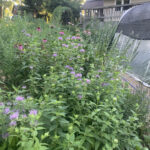
In today’s modern world, the idea of being connected is tied to technology and to ourselves rather than the living, breathing world around us. If you are “connected,” you have the latest smart phone or other 4G device, and you have the Internet at your fingertips, all the time, anytime. You can connect with friends on Facebook, post pictures and videos, or find directions. And those who lack such technology due to its cost or their own principles are viewed as strange or old-fashioned. Sometime over the last decade or so this technology—this so-called connectedness—became pinnacle to our existence. You have to constantly check your email, your texts, your FB messages, whatever—or you get quickly behind. It is an information addiction, and we are all hooked.
What exactly is the point of all of this technology? Does it teach us things? Sure, if facts and information are lessons to be learned. Does it let you keep up with your family, old friends, colleagues? Sure, and although perhaps too much. But what else does it do? It violates our privacy. It makes us overly-dependent upon it to the detriment of all else. It inundates us, every day of every minute, with mostly useless garbage. With a constant stream of media fiascos about politicians, Hollywood, the latest meme, and other useless trivia. And perhaps—most importantly—it doesn’t seem to often connect us with the things that really matter and that are having tremendous impact on our world—melting ice caps, the loss of indigenous native tribes’ land, or the massive extinctions of non-human persons.
I’m not a luddite—I teach partially online classes, I engage with my students, colleagues using the web and conduct my research all using technology. I have an active Facebook account, regularly text my friends, and enjoy watching Netflix. I use the web daily to look up information for personal, professional, and civic purposes. I’m your typical Internet user—and yes, I can certainly see the benefit. But I also have to question how “connected” we really are and what we lose in this exchange. And let me be clear—it IS an exchange. Your time, your focus, your energy—for what? This all became much clearer to me when I started taking mandatory “breaks” from the chaos of our technology.
In the last few years, I’ve attend at least one druid gathering. Last year, I attended two—Rites of Spring put on by the Earth Spirit group at the end of May, and the OBOD East Coast Gathering in September. At both gatherings, you are up on a mountain, far away from cell phone towers and WiFi hotspots. I consider these gatherings to be technological detoxification days, as we go out in the woods and practice a different kind of connection—learning about the land, communing with the land, and learning from one another. Suddenly, you get away from it all and experience the true peace and relaxation that comes from not obsessing over your email.
Until I went away—from all of it, even removing the opportunity to access the technology—I didn’t realize how much I depended on it. How much time it sucked away, and how much it stressed me out. I spent five glorious days in the summer on a mountaintop, and after a few days in that peaceful state, I wasn’t sure I wanted to return. On that mountain, I found a tranquility I simply could not attain in our fast-paced, web-rich world. I listened to the wind in the trees, I sat and watched squirrels, I did a little painting, and I spent time in meditation and communion with the living Earth. We also connect with each other—to grow and learn. There is a kind of power in this connection; when we remove the technology from our lives and entertain ourselves around bardic circles with stories, song, and fire.
And when I came down from that mountain, I was thrust back into our consumerist, face-paced, technology-obsessed culture, which was one of the most shocking and stressful experiences of my adult life. The first thing that occurred, after some driving, was that we stopped at a rest stop full of plastic-coated everything, over-processed food, and screaming children. The full force of it—a culture in which I had spent my entire life, a culture in which I had lived, and while I certainly questioned, never completely threw away because I, too, benefit from it—hit me like a horrible wave. It took me days to recover from the shock. To slowly acclimate myself back into the technological miasma. I haven’t been the same since.
This, to me, these spiritual retreats allow for a much deeper sense of connection. The realization, as I walk through the forest and listen to the voices of the trees, that in this forest, there are no trivial bit of information. It is a perfect, well connected system and I am a part of that system. Each life form, whether humans want to admit it or not, is dependent upon the life forms around it.
I think with everything we connect ourselves to—there is an exchange. This can be a positive, uplifting exchange or something that slowly eats away at our souls. There is a reason that many current magical texts suggest removing oneself from the mainstream media. I’m not advocating the complete abandonment of technology and the consumerism that goes with it. But I am suggesting that it is helpful to regularly seek ways to refresh your soul away from the intensity of it all.


